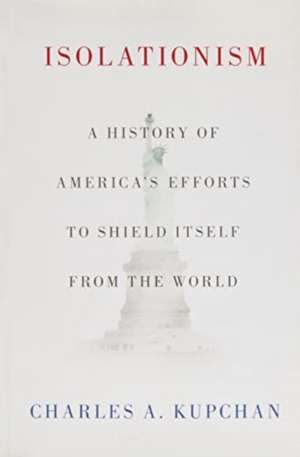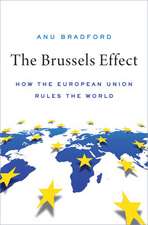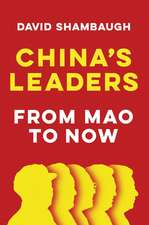Isolationism: A History of America's Efforts to Shield Itself from the World
Autor Charles A. Kupchanen Limba Engleză Paperback – 14 noi 2022
| Toate formatele și edițiile | Preț | Express |
|---|---|---|
| Paperback (1) | 146.65 lei 10-16 zile | +43.80 lei 4-10 zile |
| Oxford University Press – 14 noi 2022 | 146.65 lei 10-16 zile | +43.80 lei 4-10 zile |
| Hardback (1) | 171.61 lei 10-16 zile | |
| Oxford University Press – 19 oct 2020 | 171.61 lei 10-16 zile |
Preț: 146.65 lei
Preț vechi: 165.14 lei
-11% Nou
Puncte Express: 220
Preț estimativ în valută:
28.07€ • 29.19$ • 23.17£
28.07€ • 29.19$ • 23.17£
Carte disponibilă
Livrare economică 14-20 martie
Livrare express 08-14 martie pentru 53.79 lei
Preluare comenzi: 021 569.72.76
Specificații
ISBN-13: 9780197642610
ISBN-10: 0197642616
Pagini: 464
Dimensiuni: 235 x 156 x 27 mm
Greutate: 0.66 kg
Editura: Oxford University Press
Colecția OUP USA
Locul publicării:New York, United States
ISBN-10: 0197642616
Pagini: 464
Dimensiuni: 235 x 156 x 27 mm
Greutate: 0.66 kg
Editura: Oxford University Press
Colecția OUP USA
Locul publicării:New York, United States
Recenzii
In this excellent account, Kupchan, a former policy maker, traces the history of American foreign policy from the French and Indian War to the Trump presidency, organizing his work around the nation's isolationist tradition.
...so comprehensive. It goes through the entire American history of foreign policy through the lens of isolationism. It's such an impressive work.
With this well-written and interesting book on a traditionally important subject isolationism in American history and as an ongoing issue Prof. Kupchan has made a significant contribution to the literature on international affairs.
Comprehensive and objective, Kupchan's Isolationism is a useful contribution to the history and contemporary understanding of American isolationism.
Isolationism is a carefully researched, clearly presented study of American foreign policy that demonstrates the enduring power of American skepticism about open-ended International commitments while making the case for continued American engagement. By grounding his policy arguments in a careful review of American history, Kupchan not only strengthens his case but sets an example which other policymakers would be wise to follow.
This is a significant book. Kupchan has produced the first comprehensive study of American isolationism. He is totally fair-minded and unfailingly insightful in telling the story of isolationism from its origins at the founding of the Republic down to its resurgence at the outset of this new century. This is a book that everyone who cares about the past and present of American foreign policy should read.
At a time when the way forward in US foreign relations seems more uncertain than ever, Kupchan takes a timely, detailed, and unsparing look at the role of isolationism in the broad sweep of US history. The general reader, scholar, and policymaker can all profit from this compelling account.
The battle for the future of America's foreign policy rages all around us. This learned, wise, and deeply engaged history of US isolationist impulses from the founding up to today is a much-needed book, and the selective commitments and judicious retrenchments it calls for are recipes for good policymaking.
At a time when many are urging America to retreat internationally, Kupchan's illuminating history of US foreign policy reminds us of isolationism's pitfalls as well as its continuing allure. Scholars and policy makers alike will benefit from this book's trenchant analysis of America's past and wise counsel about how to forge a more balanced, realistic, and enduring foreign policy going forward.
Charles Kupchan reminds us that a globally assertive foreign policy is more the exception than the norm in American history. Even those who do not fully agree with his arguments will find this book sharply argued, provocative, and engaging.
In this timely, judicious, and thoughtful book, Kupchan adds depth and dimension to our understanding of the United States' foreign relations and the strategic choices now facing it. In tracing isolationism's origins to the earliest days of the Republic and showing its iterations in successive generations, he reminds us of how powerful a force it has been
Astute political history.
An erudite and evenhanded study of the isolationist impulse in American foreign policy.
Isolationism is a deeply researched, fascinating look at how an urge to keep the world at bay has largely defined the United States and its foreign policy since the country's founding.
[A] valuable volume... compellingly demonstrates that the notion of American exceptionalism was as closely tied to isolationism-the 'city on a hill,' standing above and apart from a quarrelsome world-as it later would be to the country's postwar internationalism.
Isolationism arrives at a prescient moment.
Isolationism has many merits. It comprehensively describes the arc of American diplomatic history from George Washington's 'Farewell Address' to Donald Trump's redux of 'America First.' It is also eminently fair-minded, not only to the liberal internationalists and deep engagers whom Kupchan thinks have set America up for our post-Cold War fall but especially to the alternative grand strategic tradition that Kupchan fears has gotten a bad rap since World War II.
It is only now, with this book, that someone has treated the full scope of isolationism with true insight and understanding. Charles Kupchan has told for the first time the entire history of this foreign policy phenomenon from its inception at the founding of the American republic down to the present time.
Taken in all, Kupchan has produced a first-rate account. The style is readable, the research thorough, manifesting a superior mastery of primary sources and the scholarly literature. By and large, Kupchan's treatment is masterful, essential reading for policymakers and a public that is prone to cliché thinking. Professors of American diplomatic history would do well to assign this work; at the very least, they should update their lecture notes. Hopefully, this work will force Americans to leave the world of polemics for that of reflection and responsible analysis.
...so comprehensive. It goes through the entire American history of foreign policy through the lens of isolationism. It's such an impressive work.
With this well-written and interesting book on a traditionally important subject isolationism in American history and as an ongoing issue Prof. Kupchan has made a significant contribution to the literature on international affairs.
Comprehensive and objective, Kupchan's Isolationism is a useful contribution to the history and contemporary understanding of American isolationism.
Isolationism is a carefully researched, clearly presented study of American foreign policy that demonstrates the enduring power of American skepticism about open-ended International commitments while making the case for continued American engagement. By grounding his policy arguments in a careful review of American history, Kupchan not only strengthens his case but sets an example which other policymakers would be wise to follow.
This is a significant book. Kupchan has produced the first comprehensive study of American isolationism. He is totally fair-minded and unfailingly insightful in telling the story of isolationism from its origins at the founding of the Republic down to its resurgence at the outset of this new century. This is a book that everyone who cares about the past and present of American foreign policy should read.
At a time when the way forward in US foreign relations seems more uncertain than ever, Kupchan takes a timely, detailed, and unsparing look at the role of isolationism in the broad sweep of US history. The general reader, scholar, and policymaker can all profit from this compelling account.
The battle for the future of America's foreign policy rages all around us. This learned, wise, and deeply engaged history of US isolationist impulses from the founding up to today is a much-needed book, and the selective commitments and judicious retrenchments it calls for are recipes for good policymaking.
At a time when many are urging America to retreat internationally, Kupchan's illuminating history of US foreign policy reminds us of isolationism's pitfalls as well as its continuing allure. Scholars and policy makers alike will benefit from this book's trenchant analysis of America's past and wise counsel about how to forge a more balanced, realistic, and enduring foreign policy going forward.
Charles Kupchan reminds us that a globally assertive foreign policy is more the exception than the norm in American history. Even those who do not fully agree with his arguments will find this book sharply argued, provocative, and engaging.
In this timely, judicious, and thoughtful book, Kupchan adds depth and dimension to our understanding of the United States' foreign relations and the strategic choices now facing it. In tracing isolationism's origins to the earliest days of the Republic and showing its iterations in successive generations, he reminds us of how powerful a force it has been
Astute political history.
An erudite and evenhanded study of the isolationist impulse in American foreign policy.
Isolationism is a deeply researched, fascinating look at how an urge to keep the world at bay has largely defined the United States and its foreign policy since the country's founding.
[A] valuable volume... compellingly demonstrates that the notion of American exceptionalism was as closely tied to isolationism-the 'city on a hill,' standing above and apart from a quarrelsome world-as it later would be to the country's postwar internationalism.
Isolationism arrives at a prescient moment.
Isolationism has many merits. It comprehensively describes the arc of American diplomatic history from George Washington's 'Farewell Address' to Donald Trump's redux of 'America First.' It is also eminently fair-minded, not only to the liberal internationalists and deep engagers whom Kupchan thinks have set America up for our post-Cold War fall but especially to the alternative grand strategic tradition that Kupchan fears has gotten a bad rap since World War II.
It is only now, with this book, that someone has treated the full scope of isolationism with true insight and understanding. Charles Kupchan has told for the first time the entire history of this foreign policy phenomenon from its inception at the founding of the American republic down to the present time.
Taken in all, Kupchan has produced a first-rate account. The style is readable, the research thorough, manifesting a superior mastery of primary sources and the scholarly literature. By and large, Kupchan's treatment is masterful, essential reading for policymakers and a public that is prone to cliché thinking. Professors of American diplomatic history would do well to assign this work; at the very least, they should update their lecture notes. Hopefully, this work will force Americans to leave the world of polemics for that of reflection and responsible analysis.
Notă biografică
Dr. Charles A. Kupchan is Professor of International Affairs at Georgetown University and Senior Fellow at the Council on Foreign Relations. From 2014-2017 Kupchan served as Special Assistant to the President and Senior Director for European Affairs on the National Security Council in the Obama White House. He was Director for European Affairs on the NSC during the first Clinton administration. Prior, he worked in the U.S. Department of State on the Policy Planning Staff. Kupchan has served as a visiting scholar at Harvard University's Center for International Affairs, Columbia University's Institute for War and Peace Studies, and other renowned institutions. He was a Henry A. Kissinger Scholar at the Library of Congress, a Fellow at the Woodrow Wilson International Center for Scholars, a Senior Fellow at the Transatlantic Academy, and a recipient of the Hubert H. Humphrey Award for notable public service by a political scientist.





















